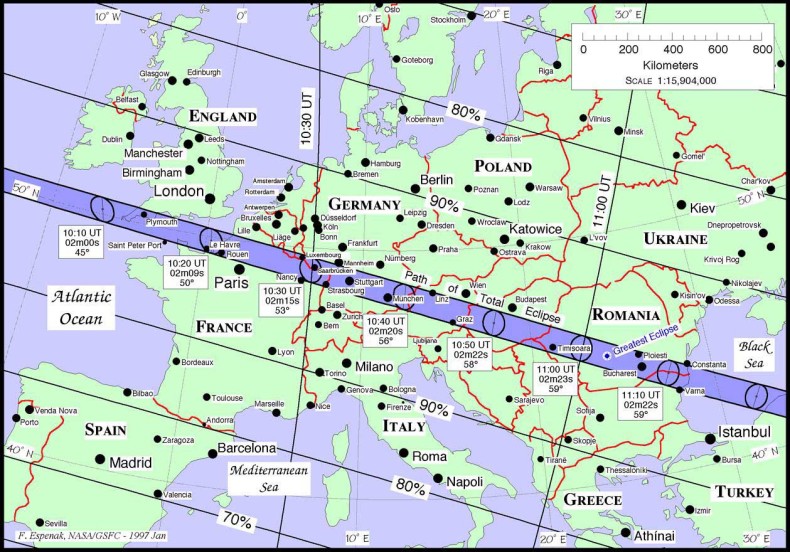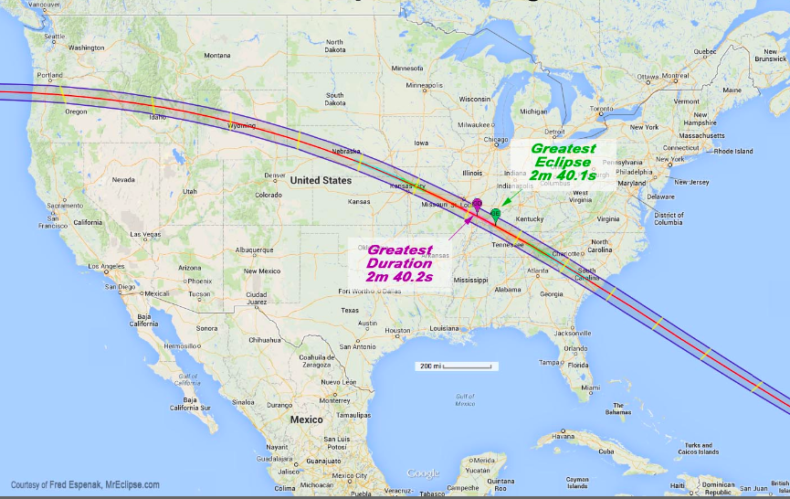On Monday the world gets another look at a total eclipse of the Sun. Viewers in the United States will be especially fortunate. See the map immediately below…and then please continue to scroll to a map showing the path of a previous solar eclipse—one that I witnessed for myself in 1999. I wrote about that eclipse here a few years ago; I’ve adapted that essay now for current circumstances.
Total Eclipse of August 21, 2017:
Total Eclipse of August 11, 1999:

During a total eclipse of the sun, the landscape darkens. But you knew that. What you might not know—what I didn’t know, anyway, when I observed a total solar eclipse on August 11, 1999—is that the experience comes with a lot of other sensory overload.
I found myself thinking about that eclipse while anticipating the one that will be happening Monday, beginning at 15:46 GMT over the Pacific Ocean and then barreling across the United States. In 1999, the path of totality cut across the heart of Europe and the abdomen of Asia; I saw it from the deck of a cruise ship in the Black Sea, courtesy of a magazine that paid all expenses—round-trip air to Athens, cruise passage, ground transportation—in exchange for an 800-word article. (Plus the fee for writing the article.) (Those were the days.) While I clearly remember the sight of the moon’s disk slipping in front of the sun’s—somewhere I have a tape recording of my on-the-scene musings, which, as I recall, consisted mostly of “Wow”s—I also can conjure, just as vividly, memories of what I didn’t expect.
First, the shadow. Of course a solar eclipse comes with a shadow. As a kid, I used to sit on the front porch of my house in Chicago and wait for the shadows of planes landing at O’Hare Airport to skim the grass in the field across the street. How could the moon not throw its own shadow? Still, I hadn’t thought to anticipate the onrush of midday darkness, so seeing it barreling toward me across the surface of the sea certainly got my attention.
Then, the temperature. As soon as the edge of the moon belly-bumps the edge of the sun, the weather can turn noticeably cooler. On our ship, idling on open waters on a calm August afternoon, the temperature over the two-plus hours between first contact and totality dropped 21 degrees Fahrenheit, to 83.
Finally, the sounds of wildlife. As the sky darkens, animals will begin to settle down for the night, which in the case of birds means they will stop chirping. Witnesses describe the phenomenon as an eerie silence. I myself can’t speak from experience, since my ship was many dozens of miles from any shore.
Still, if you should find yourself on Monday in the path of totality, or even near it, just remember: Watch for the shadow, wait for the cooling, and listen for the sound of wildlife—not just the unnerving absence of birdsong, but the one that interrupted my own reverie: the release, from hundreds of humans staring up, of individual variations on the word “Wow.”
* * *
Image credits: NASA.

I am looking forward to the eclipse here in Wyoming.. Sheridan gets 95%, not a totality, but Casper (130 miles south) will be a mad house…. hotels have been booked for a year. They expect 150,000 visitors.. I’ll take 95% on an empty hill top.
I happened into an unforgettable experience of the August 1999 eclipse on the opposite side of he earth—southeastern Oregon. It’s one of the darkest-night areas in the lower 48 states, and the alignment of the moon with the sun made that night the most moonless night possible, hence the starriest night I ever saw.
Also the most aromatic: a thunderstorm had passed a couple of hours earlier, wetting the sagebrush—not the common big sagebrush, but Artemisia arbuscula, with a completely distinct smell. I pulled off the highway onto a dirt road, plopped down my sleeping bag, and was overpowered by stars and sage.